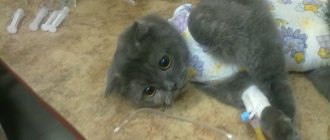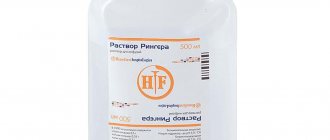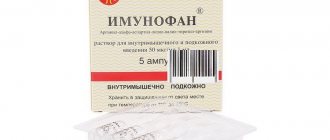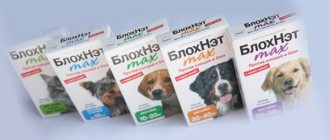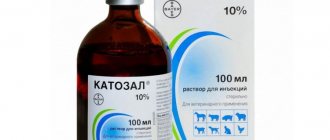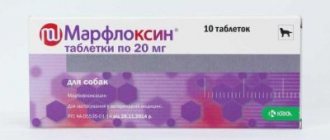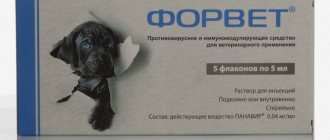Ringer-Locke solution: indications for use in cats
The drug is a clear liquid identical to blood plasma in the composition of electrolytes. The medicine is used to treat diseases characterized by tissue loss of fluid, salts, and intoxication. Ringer-Locke solution is used for detoxification, restoring water-salt balance, washing eyes or wounds.
The drug is indicated for use in the following cases:
- large-scale blood loss;
- intoxication;
- dehydration due to vomiting and diarrhea;
- poisoning, insect bites;
- constipation and intestinal obstruction;
- conjunctivitis;
- rehabilitation after surgery.
Reviews
Veterinarians
Mikhail, veterinarian, Moscow:
“The drug has proven itself well in that it does not cause irritation, even when injected onto a nearby surface of the animal’s body.
Therefore, large volumes of Ringer's solution and its derivatives can be administered subcutaneously. And this is often necessary when the dog is already in the last stage of dehydration. At the same time, her veins collapse greatly and administering the drug intravenously becomes impossible.”
Georgy, veterinarian, Krasnoyarsk:
“You can say I pulled out an East European Shepherd with severe food poisoning using this saline solution. I declare responsibly: a good option. The dog quickly recovered. The owner is happy. I made a conclusion for myself: I will definitely use Ringer’s options in my practice.”
Owners
Alevtina, dog owner, Novgorod:
“My dog was in an accident. I was already desperate to save her - there was a lot of blood loss. She didn’t need a donor because she was given Ringer-Locke solution – it perfectly replaces blood plasma.”
Maria, dog owner, Samara:
“I completely accidentally found out that Ringer’s solution can be used to wash wounds and eyes of dogs. Now you don’t need to worry that there is no special expensive solution. We are very pleased with this discovery."
How does Ringer-Locke solution work on a cat's body?
Ringer-Locke solution contains glucose, which reacts chemically with toxic substances, converting them into safe compounds. To remove toxins from the body, it is not water that is needed, but salts - potassium, sodium and calcium chlorides. The concentration of electrolytes in Ringer Locke solution is the same as in the blood of mammals.
The drug saves a cat’s life when blood thickening occurs due to loss of fluid. If electrolytes are not introduced, red blood cells will stick together, which will lead to the formation of blood clots.
Application area
Its main effect as a medicinal drug is to replenish fluid and salts in the body. Therefore, it is used in appropriate conditions. These include:
- Dehydration of various origins.
- Intoxication: poisoning with heavy metal compounds, food poisoning, infections, helminthic infestations, extensive injuries, burns, etc.
- Blood loss.
- Shock states.
Ringer-Locke is also successfully used to cleanse and rinse wounds, cavities and visible mucous membranes (for example, eyes, mouth, etc.). These are the main directions for the use of Ringer-Locke and other isotonics.
Ringer-Locke has been successfully used in various animal species, incl. and in dogs. When it comes directly to dogs, the most common cases of using Ringer-Locke solution in postoperative therapy, for food and heavy metal poisoning, and for intoxications that occur during the course of infectious diseases. Less commonly, when removing animals from a state of intoxication in cases of extensive helminthiasis, extensive injuries and burns, in states of shock, and as a plasma substitute for blood loss.
The effect of Ringer-Locke solution stands out among other isotonics due to the presence of glucose in its composition. This combination of “ingredients” is most successfully accepted by the body in the treatment of dehydration, both when administered intravenously and subcutaneously, which is especially important when treating extremely dehydrated and emaciated animals.
This drug should not be used as a solvent for other medications. This drug has a fairly saturated composition and there is a possibility that any of its components may enter into an undesirable chemical reaction with the drug, requiring dilution.
Ringer-Locke solution: instructions for use and dosage
The veterinary drug is produced in glass bottles of 100 ml. For medical purposes, containers of a different size can be used. The shelf life of the medicine is 2 years from the date of manufacture indicated on the label. Must be stored at room temperature. The drug is intended for intravenous or subcutaneous injection.
Be sure to read:
Imaverol: instructions for cats, when indicated and contraindicated, method of application, dosage
The veterinarian prefers to put in a drip, since the greatest therapeutic effect is achieved with a uniform and gradual flow of glucose and salts into the blood. The maximum daily dose is 150 ml, single dose - 50 ml. If a visit to the clinic or the veterinarian’s arrival at home is delayed, the cat’s owner can provide independent assistance to the pet. Intramuscular administration will do neither harm nor benefit.
Ringer's solution is drawn into a large syringe and injected subcutaneously into several places. Bumps form, but the body absorbs the liquid before our eyes. Up to 50 ml of liquid can be injected into your pet once. Dosage by weight has not been developed, and cases of overdose are unknown. Therefore, the kitten is given 5-10 ml of liquid at a time.
Ringer's solution, which does not contain glucose, has a similar effect. Therefore, the drug does not have a detoxifying effect. In emergency situations, use a saline solution that contains only sodium chloride. The medical products Hemodez and Poliglyukin have a similar effect, but they should not be used without the permission of a veterinarian.
Pregnant, lactating and puppies
Ringer's drug and its derivatives should not be used to treat pregnant dogs. This can negatively affect the course of pregnancy and the development of the babies. Also, veterinarians do not recommend using the drug to help animals that are feeding their offspring.
Puppies weighing about 300 g are given injections of 10-15 ml twice a day subcutaneously into the suprascapular area so as not to get into the muscle (the skin is pulled back, the needle is inserted below the fingers holding the skin).
Ringer's Locke solution for animals: when is it contraindicated?
The use of the drug is contraindicated in situations where there is no dehydration, but there is swelling. The idea of administering Ringer Locke solution in such a situation would not occur to a veterinarian, but a desperate cat owner may commit an ill-considered act.
So, the use of Ringer-Locke solution is contraindicated in the following situations:
- pulmonary or cerebral edema;
- chronic renal failure, in which the outflow of urine becomes difficult;
- urolithiasis, cystitis;
- heart failure.
Side effects
the dosage is not violated when using the drug , then it does not cause any side effects. Ringer's solution is a medicine that belongs to the safe group. Sometimes animals may develop allergies. In this case, you need to cancel treatment with the solution.
Death from the drug
Violation of the dosage can cause not just unpleasant consequences, but also death . An excessive dose provokes hyperhydration, which leads to swelling of the lungs and brain, which can result in the death of the dog.
Important information about Ringer's solution for dogs and its combinations
Ringer's solution is a drug from a group of medications that are used to restore electrolyte levels.
This need arises in the case of various intoxications in animals, incl. in pets: cats and dogs.
What is it for?
Ringer's solution is known as a remedy used to treat and relieve human conditions. But it is also widely used in veterinary practice. At the same time, you need to know that, taking into account the physiology of animals, its composition is somewhat different. It contains chlorides: sodium, potassium, calcium and sodium bicarbonate.
The product is effectively used to treat dehydration and eliminate its consequences. The drug is easily accepted by the body and does not cause side effects.
The components included in the composition successfully help cope with poisoning and act effectively against allergies.
According to the instructions, the solution is used for intravenous administration. In some cases, if there is an urgent need, it can be used as an external agent for washing wounds or visible mucous surfaces.
Intramuscular administration of the drug is possible only when treating young animals, if puppies, kittens or rabbits require urgent help - the condition is serious. Such injections are done because children have very thin veins, which can be difficult to find even for a high-level professional.
The drug can be used in combination with other drugs.
Krebs-Ringer
Krebs-Ringer's solution is intended to replenish fluids and salts in the dog's body.
This is a water-salt preparation, the composition of which is different. It contains sodium dihydrogen phosphate, calcium chloride, potassium chloride, sodium chloride, magnesium chloride, sodium bicarbonate and glucose. It is this combination of components that is necessary in cases where particularly intensive liver support is required during the treatment process.
The action of the medicine is effective not only for various dehydration of the animal, but also for intoxication, shock, and blood loss. It is also used to cleanse and rinse wounds, mucous membranes of the eyes, mouth, etc.
Ringer-Locke
Another variety is Ringer-Locke solution. This is a colorless, transparent aqueous preparation, which contains sodium, potassium, calcium, sodium bicarbonate and glucose chlorides.
It is used to regulate water-salt and acid-base balance in the dog's body. Once in the body, the medicine is quickly distributed throughout the organs and tissues of the animal.
Indications for use are states of shock, acute blood loss (together with blood transfusion), poisoning, uncontrollable vomiting, toxic dyspepsia, burns, cholera.
Often used for dogs in the postoperative period.
Ringer-Tirode
This variety includes sodium bicarbonate and sodium dihydrogen phosphate, as well as potassium chloride, sodium chloride, magnesium chloride, calcium chloride, and glucose.
The drug is effective in emergency care in case of a dog suffering from thermal injuries, in a state of shock of various etiologies, in case of electric shock, in case of peritonitis or the presence of intestinal obstruction.
Ringer-Tyrode solution also successfully treats acute poisoning and intestinal infections.
What all of these drugs have in common is the impossibility of using them if the animal has pulmonary or cerebral edema, acidosis, renal or heart failure, or if there is an individual intolerance to its components.
Dosage
The dosage of the drug depends on the weight of the animal and the general clinical picture. It is also inextricably linked with the method of administering solutions: in the form of an injection or a dropper. But in any case, the dose is calculated by a veterinarian .
If it is a small dog, then the daily dose should not exceed 100 ml; for a large animal it can be 400 ml.
If the dosage is violated, the animal may develop chloric acidosis or hyperhydration. In such a situation, the use of the medicine should be stopped or its dose reduced.
Puppies are given the solution by injection, usually for 2 days. The daily dose is from 10 to 15 ml for a weight of 300 g, it should be injected 2 times a day.
How to inject?
More often, the solution is administered intravenously, by drip, at a rate of 4-8 ml/kg per hour. Subcutaneous administration is also possible. The volume is from 50 ml to 3 l - it depends on the route of administration and how effective the anti-dehydration and detoxification therapy is.
Rectally, the drug is prescribed for rinsing in 75-100 ml. Only a sterile solution is used.
The drug is injected subcutaneously into the withers on the left or right, in the sacrum area and other places where it is possible to pull back the skin so as not to get the needle into the muscle. This is a fractional administration and is recommended as more effective.
Before injecting yourself, you should consult your veterinarian .
Side effects
the dosage is not violated when using the drug , then it does not cause any side effects. Ringer's solution is a medicine that belongs to the safe group. Sometimes animals may develop allergies. In this case, you need to cancel treatment with the solution.
Death from the drug
Violation of the dosage can cause not just unpleasant consequences, but also death . An excessive dose provokes hyperhydration, which leads to swelling of the lungs and brain, which can result in the death of the dog.
Pregnant, lactating and puppies
Ringer's drug and its derivatives should not be used to treat pregnant dogs. This can negatively affect the course of pregnancy and the development of the babies. Also, veterinarians do not recommend using the drug to help animals that are feeding their offspring.
Puppies weighing about 300 g are given injections of 10-15 ml twice a day subcutaneously into the suprascapular area so as not to get into the muscle (the skin is pulled back, the needle is inserted below the fingers holding the skin).
Different breeds
Veterinarians prescribe the volume of solution depending on the weight and size of the dog, taking into account not the breed, but the type of disease and its course. The state of the animal itself at the time of providing therapeutic assistance plays a role in this.
In this regard, even the daily norm is a conditional indicator. For small breeds it is a maximum of 100 ml, for large dogs (Great Danes, St. Bernards, etc.), if dehydration is significant - from 300 to 400 ml. There are situations when a higher dose is required.
Veterinarians
Mikhail, veterinarian, Moscow:
“The drug has proven itself well in that it does not cause irritation, even when injected onto a nearby surface of the animal’s body.
Therefore, large volumes of Ringer's solution and its derivatives can be administered subcutaneously. And this is often necessary when the dog is already in the last stage of dehydration. At the same time, her veins collapse greatly and administering the drug intravenously becomes impossible.”
Georgy, veterinarian, Krasnoyarsk:
“You can say I pulled out an East European Shepherd with severe food poisoning using this saline solution. I declare responsibly: a good option. The dog quickly recovered. The owner is happy. I made a conclusion for myself: I will definitely use Ringer’s options in my practice.”
Owners
Alevtina, dog owner, Novgorod:
“My dog was in an accident. I was already desperate to save her - there was a lot of blood loss. She didn’t need a donor because she was given Ringer-Locke solution – it perfectly replaces blood plasma.”
Maria, dog owner, Samara:
“I completely accidentally found out that Ringer’s solution can be used to wash wounds and eyes of dogs. Now you don’t need to worry that there is no special expensive solution. We are very pleased with this discovery."
Price
You can purchase Ringer's solution at veterinary pharmacies. It is popular as a remedy for various intoxications. The price of the drug is low and ranges from 50 to 60 rubles. per bottle.
The cost of the medicine depends on the manufacturer and the characteristics of supplies to the pharmacy.
Analogs
If the drug is not available, you can purchase its analogues at veterinary pharmacies, which are used by veterinarians to treat dogs.
Thus, Hartmann's solution is used in almost the same cases as the Ringer-Locke solution, the dosages are also the same. But the price of this drug is quite high - from 500 rubles.
When an animal's body is dehydrated due to diarrhea, Regidron powder . It is intended for oral use, which somewhat complicates therapy.
In the form of solutions there are analogues such as Quintasol, Ionoplasm (prescription only, which is often inconvenient), Trisol . These drugs are inexpensive.
Conclusion
Using Ringer's solution and its derivatives in strict accordance with the recommendations, you can effectively cope with various intoxications in animals, and also use these drugs in emergency care in case of wounds associated with blood loss, and as a remedy for other injuries.
Source: https://puppy.plus/zdorovie/lechenie/preparaty/rastvor-ringera.html
Reviews about the drug
Many pet and farm animal owners consider Ringer-Locke solution to be quite effective. This drug helps with intoxication, judging by the reviews, it’s actually very good. At the same time, it almost never gives side effects.
Ringer-Locke solution for animals, instructions for use, as already mentioned, require intravenous administration. Some pet owners, of course, consider the inconvenience of use and the need to visit a clinic for the procedure to be some of the disadvantages of this product.
Another disadvantage of this drug is that it is rarely sold in veterinary pharmacies. Finding it can be really difficult. Some owners of pets and farm animals advise purchasing this medicine in regular human pharmacies, if necessary. But even in such retail outlets, the Ringer-Locke solution, the instructions for use of which were discussed above, is usually made only to order.
In any case, when purchasing a drug, among other things, you should study, of course, its composition. In some cases, one of the ingredients of such a medicine may also be glucose. This substance is able to remove toxins from the liver, which increases the effectiveness of the drug. However, for example, if a cat or dog is diabetic, such a remedy, of course, may be harmful to them.
Composition and mechanism of action of the drug
The Ringer-Locke solution is similar in content to blood plasma, therefore it is harmless and perfectly replenishes fluid loss. It has no irritating or toxic effect and can be administered to kittens. The transparent liquid is available in 200 or 400 ml bottles and 500 ml bags. The drug binds toxins, poisons, heavy metals, neutralizing their harmful effects on the cat’s body. Harmful substances come out with urine. The medicine stops the adhesion of formed blood cells, replenishes fluid reserves during dehydration, and restores water-salt balance. The Ringer-Locke solution contains the following substances:
- saline solution 0.9%;
- sodium bicarbonate;
- potassium chloride;
- glucose;
- pure water.
According to reviews from cat owners, timely and correct administration of Ringer-Locke liquid saved their pets from death.
Interaction
Caution should be used when combining the medicine with certain drugs, such as NSAIDs , estrogens or anabolic steroids .
When combined with cardiac glycosides, the load on the cardiovascular system increases.
Concomitant use with diuretics , angiotensin-converting enzyme or potassium supplements can lead to hyperkalemia .
